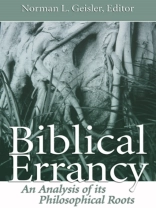Philosophy has given us insights into the reflections of thinkers on such subjects as God, mankind, the world, and the possibility of knowing ultimate reality. The processes of reasoning and the conclusions of logic are often intensely fascinating. Dr. Geisler reminds us, however, that the premises and the arguments of philosophy are often faulty, leading to a wholly inadequate view of knowledge and revelation. He reiterates Paul’s warning to the Colossian Christians: See to it that no one takes you captive through hollow and deceptive philosophy. The contributors to this volume show how the basic presuppositions of many philosophers lead to a denial of a divine, inerrant revelation. The views of some modern theologians regarding revelation find their roots in such deceptive philosophy.
Chapter titles are:
-’Inductivism, Materialism, and Rationalism: Bacon, Hobbes, and Spinoza’ – Norman L. Geisler
-’Skepticism: Hume’ – Gary R. Habermas
-’Agnosticism: Kant’ – W. David Beck
-’Transcendentalism: Hegel’ – Winfried Corduan
-’Existentialism: Kierkegaard’ – E. Herbert Nygren
-’Atheism: Nietzsche’ – Terry L. Miethe
-’Noncognitivism: Wittgenstein’ – John S. Feinberg
-’Mysticism: Heidegger’ – Howard M. Ducharne, Jr.
Chapter titles are:
-’Inductivism, Materialism, and Rationalism: Bacon, Hobbes, and Spinoza’ – Norman L. Geisler
-’Skepticism: Hume’ – Gary R. Habermas
-’Agnosticism: Kant’ – W. David Beck
-’Transcendentalism: Hegel’ – Winfried Corduan
-’Existentialism: Kierkegaard’ – E. Herbert Nygren
-’Atheism: Nietzsche’ – Terry L. Miethe
-’Noncognitivism: Wittgenstein’ – John S. Feinberg
-’Mysticism: Heidegger’ – Howard M. Ducharne, Jr.
O autorze
Dr. Norman Geisler is author or coauthor of some fifty books and hundreds of articles. He has taught at the university and graduate level for nearly forty years and has spoken or debated in all fifty states and in twenty-five countries. He holds a Ph.D. in philosophy from Loyola University and now serves as Chancellor of Veritas Evangelical Seminary, in Murrieta, CA.Kup ten ebook, a 1 kolejny otrzymasz GRATIS!
Język Angielski ● Format PDF ● Strony 270 ● ISBN 9781725265332 ● Rozmiar pliku 49.3 MB ● Redaktor Norman L. Geisler ● Wydawca Wipf and Stock Publishers ● Miasto Eugene ● Kraj US ● Opublikowany 2004 ● Do pobrania 24 miesięcy ● Waluta EUR ● ID 7594648 ● Ochrona przed kopiowaniem Adobe DRM
Wymaga czytnika ebooków obsługującego DRM












